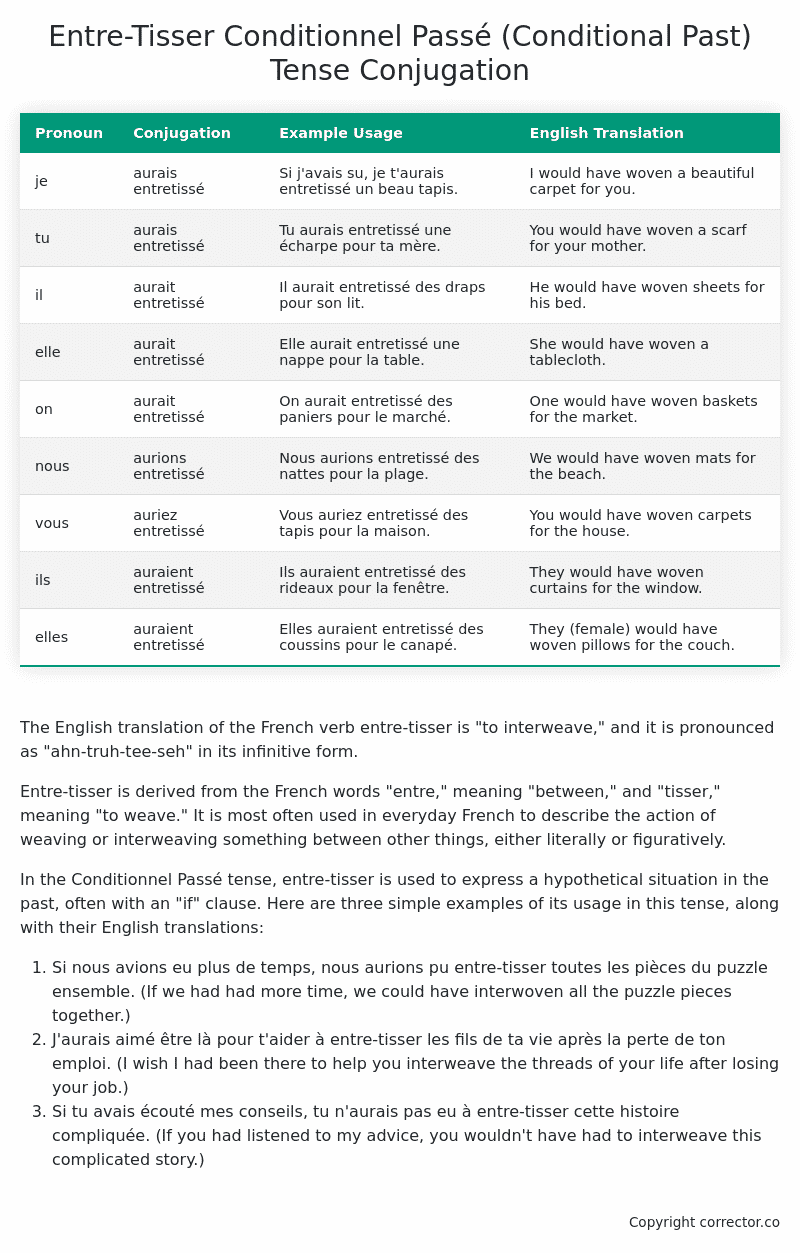Conditionnel Passé (Conditional Past) Tense Conjugation of the French Verb entre-tisser
Introduction to the verb entre-tisser
The English translation of the French verb entre-tisser is “to interweave,” and it is pronounced as “ahn-truh-tee-seh” in its infinitive form.
Entre-tisser is derived from the French words “entre,” meaning “between,” and “tisser,” meaning “to weave.” It is most often used in everyday French to describe the action of weaving or interweaving something between other things, either literally or figuratively.
In the Conditionnel Passé tense, entre-tisser is used to express a hypothetical situation in the past, often with an “if” clause. Here are three simple examples of its usage in this tense, along with their English translations:
- Si nous avions eu plus de temps, nous aurions pu entre-tisser toutes les pièces du puzzle ensemble. (If we had had more time, we could have interwoven all the puzzle pieces together.)
- J’aurais aimé être là pour t’aider à entre-tisser les fils de ta vie après la perte de ton emploi. (I wish I had been there to help you interweave the threads of your life after losing your job.)
- Si tu avais écouté mes conseils, tu n’aurais pas eu à entre-tisser cette histoire compliquée. (If you had listened to my advice, you wouldn’t have had to interweave this complicated story.)
Table of the Conditionnel Passé (Conditional Past) Tense Conjugation of entre-tisser
| Pronoun | Conjugation | Example Usage | English Translation |
|---|---|---|---|
| je | aurais entretissé | Si j’avais su, je t’aurais entretissé un beau tapis. | I would have woven a beautiful carpet for you. |
| tu | aurais entretissé | Tu aurais entretissé une écharpe pour ta mère. | You would have woven a scarf for your mother. |
| il | aurait entretissé | Il aurait entretissé des draps pour son lit. | He would have woven sheets for his bed. |
| elle | aurait entretissé | Elle aurait entretissé une nappe pour la table. | She would have woven a tablecloth. |
| on | aurait entretissé | On aurait entretissé des paniers pour le marché. | One would have woven baskets for the market. |
| nous | aurions entretissé | Nous aurions entretissé des nattes pour la plage. | We would have woven mats for the beach. |
| vous | auriez entretissé | Vous auriez entretissé des tapis pour la maison. | You would have woven carpets for the house. |
| ils | auraient entretissé | Ils auraient entretissé des rideaux pour la fenêtre. | They would have woven curtains for the window. |
| elles | auraient entretissé | Elles auraient entretissé des coussins pour le canapé. | They (female) would have woven pillows for the couch. |
Other Conjugations for Entre-Tisser.
Le Present (Present Tense) Conjugation of the French Verb entre-tisser
Imparfait (Imperfect) Tense Conjugation of the French Verb entre-tisser
Passé Simple (Simple Past) Tense Conjugation of the French Verb entre-tisser
Passé Composé (Present Perfect) Tense Conjugation of the French Verb entre-tisser
Futur Simple (Simple Future) Tense Conjugation of the French Verb entre-tisser
Futur Proche (Near Future) Tense Conjugation of the French Verb entre-tisser
Plus-que-parfait (Pluperfect) Tense Conjugation of the French Verb entre-tisser
Passé Antérieur (Past Anterior) Tense Conjugation of the French Verb entre-tisser
Futur Antérieur (Future Anterior) Tense Conjugation of the French Verb entre-tisser
Subjonctif Présent (Subjunctive Present) Tense Conjugation of the French Verb entre-tisser
Subjonctif Passé (Subjunctive Past) Tense Conjugation of the French Verb entre-tisser
Subjonctif Imparfait (Subjunctive Imperfect) Tense Conjugation of the French Verb entre-tisser
Conditionnel Présent (Conditional Present) Tense Conjugation of the French Verb entre-tisser
Conditionnel Passé (Conditional Past) Tense Conjugation of the French Verb entre-tisser (this article)
L’impératif Présent (Imperative Present) Tense Conjugation of the French Verb entre-tisser
L’infinitif Présent (Infinitive Present) Tense Conjugation of the French Verb entre-tisser
Struggling with French verbs or the language in general? Why not use our free French Grammar Checker – no registration required!
Get a FREE Download Study Sheet of this Conjugation 🔥
Simply right click the image below, click “save image” and get your free reference for the entre-tisser Conditionnel Passé tense conjugation!

Entre-Tisser – About the French Conditionnel Passé (Conditional Past) Tense
Formation
Common Everyday Usage Patterns
Expressing Unreal Past Scenarios
Polite Requests or Suggestions
Expressing Doubt or Uncertainty
Interactions with Other Tenses
Conditional Present
Indicative Past Tenses
Conditional Future
Summary
Want More?
I hope you enjoyed this article on the verb entre-tisser. Still in a learning mood? Check out another TOTALLY random French verb conjugation!


